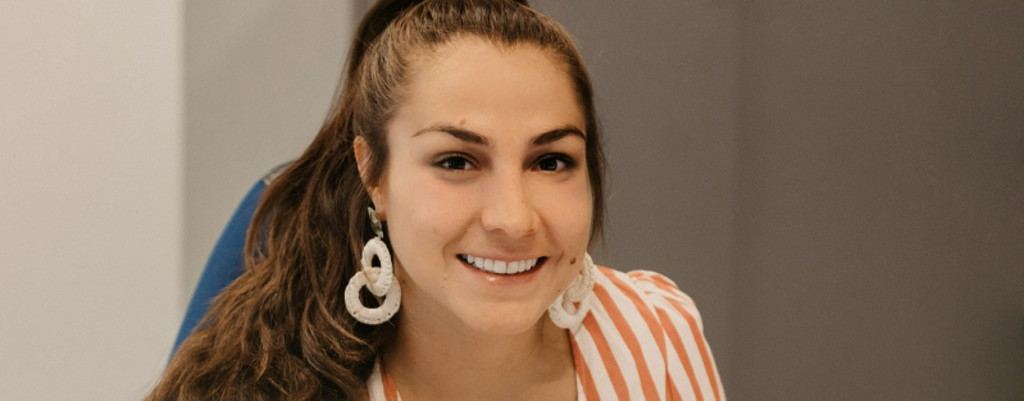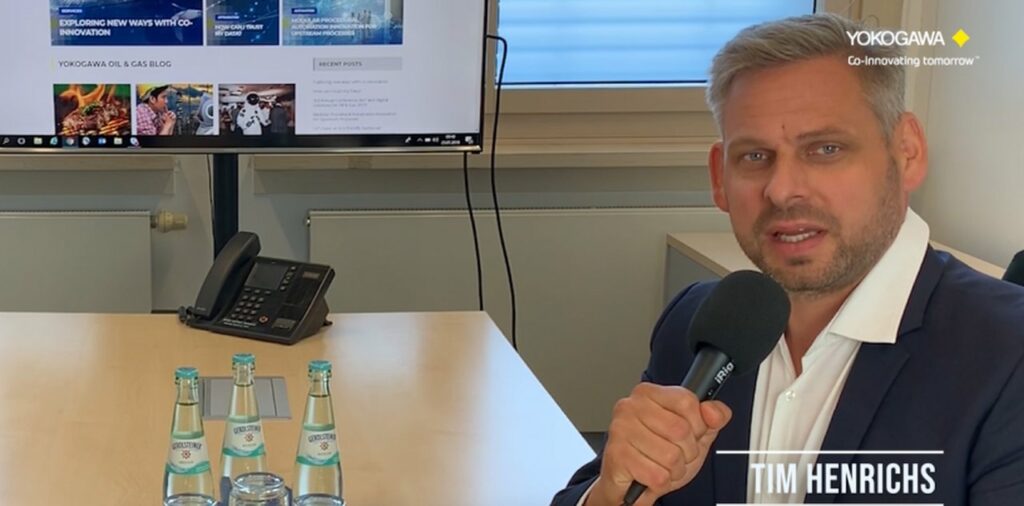In our new series “Employees at Yokogawa” we present Nicole Markert today. Born in Colombia, she came to Germany after studying engineering. She started her professional career in September 2018 as a Sales Engineer at Yokogawa.
Hello Nicole, you are a sales engineer at Yokogawa. Tell me, what are your tasks?
Nicole Markert: I am responsible for the consulting, support and coordination of technical solutions of Yokogawa automation systems in the sales phase. On the one hand, I create offers for products such as controllers, stations, etc., as well as upgrades for earlier systems. On the other hand, I also create project offers, e.g. Engineering Procurement Construction (EPC) projects. The technical offers include cost calculation, system drawings, cash flow analysis and schedule estimation for the project business.
Practically my activity looks like this: I receive a task from the customer. This can be, for example, an additional component for his existing automation system or a comprehensive technical specification for a new production plant. Should be a control or a safety instrumented system? How many signals are present? What kind of signals are involved? From this, I work out a solution within the sales team. Together with the account manager, I present the offer to the customer in a personal conversation. It is important to me to be close to the customer and therefore I am often on-site with the customer. On this basis, I am also glad to advise our customers in their day-to-day business. I advise on the entire spectrum of operational management and process control systems with integrated safety-related controls, SCADA systems, asset management tools and network IT solutions.
The engineering studies
You studied mechatronics engineering. Why did you decide to take this course?
Nicole Markert: I’m a very tech-savvy person. My father and grandfather, who both work or have worked in technical professions, infected me with the technology virus. I have always enjoyed building and creating something with my own hands.
I have always been very interested in mechanics and I was sure that I would definitely study mechanics. During my high school graduation, I attended a workshop on “electronics” and was totally enthusiastic about it. What was I going to study? Mechanics or electronics? Fortunately, at the university in Bucaramanga, the Colombian city where I grew up, there was a combination of both. Perfect for me, I thought and enrolled in mechatronics. I found it totally exciting that, in addition to mechatronics, automation and robotics were also covered during my studies. My majors were electronics and automation.
I can imagine that not many women were represented in your course of studies. Was that an advantage or disadvantage for you? And why?
Nicole Markert: When I started, there were actually only five women in my course of 100 students. We were clearly in the minority, but fortunately more women are now studying in the MINT courses. I didn’t really notice any difference then, I didn’t have any disadvantages as a woman in a male-dominated course. On the contrary, during my studies, I felt well supported by my lecturers. You could always ask questions when something wasn’t clear, and despite the tight workload, the lecturers always took the time to clear up any ambiguities. Nobody gave me the feeling that I could not cope with my studies as a woman.
From Colombia to Germany
You grew up in Colombia and studied there. What is different about the German way of working compared to Colombia?
Nicole Markert: In Colombia, I did an internship at a company working in the pulp paper industry. I felt that, as a woman in a Colombian company, I was less supported and promoted than a male intern. Especially in the production area, I noticed that I was less trusted.
In my home country, people just study wildly without worrying about market conditions. This can lead to far too many lawyers or engineers, for example. Often trained academics who can’t find a job have to struggle with temporary jobs or work for far too little money in their profession because there are more applicants than jobs.
In Germany it’s different, here you inform yourself about the job market before you start your studies and only a corresponding number of study places are offered, which may be allocated by Numerus Clausus. There are tariffs that are recorded in writing and according to which the employer must comply. A price pressure like in Colombia is officially not possible in this country.
Punctuality is also typically German. In Colombia, if one makes an appointment at 4pm, the person usually comes only around 4.30 pm. Agreed times are rather loose, nobody takes that so exactly.
Flexitime is also a German phenomenon. In Colombia, there are mostly fixed working hours.
I also think it’s great that we have 30 vacation days here at Yokogawa Germany. In Colombia, you usually only have half of them, i.e. 15 days of holiday, which you have to take all at once.
In sum, Germany is essentially social and employee-oriented.
What do you do when you’re not working at Yokogawa?
Nicole Markert: My hobbies are cooking, dancing, swimming, doing sports and listening to music. I’m not a stay-at-home person, I like to be active. Whenever I can, I am meeting my family. I love children and I love taking care of my cousins’ children, who also live here in Germany.
As an employee at Yokogawa
You’ve been working for Yokogawa for quite some time. What do you like most about Yokogawa?
Nicole Markert: The working atmosphere is really very pleasant, I feel comfortable here. The colleagues are very nice and helpful. As an employee, you have many opportunities for further training here, not only in theory but also in practice. I appreciate the flexibility of working hours thanks to the flexitime model.
Nicole Markert: My advice for graduates
What would you like to say to young graduates who are interested in an engineering position at Yokogawa? Do you have a piece of advice?
Nicole Markert: In any case, it makes sense to gain practical experience as a student and complete internships in different departments if possible. Through an internship, for example, I discovered my passion for sales engineering.
In addition, I can only advise you not to choose a course of studies for monetary reasons, but to choose a subject that really makes you happy. So listen to your heart! Don’t despair when you get rejections. That’s part of life. Don’t give up! If your heart beats for automation, you should definitely apply at Yokogawa. We are always looking forward to new colleagues.




